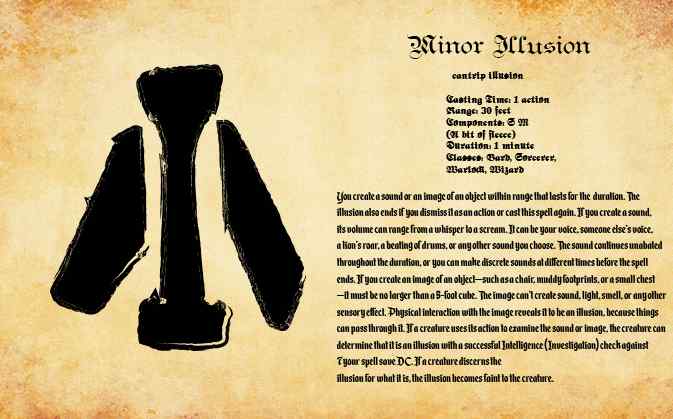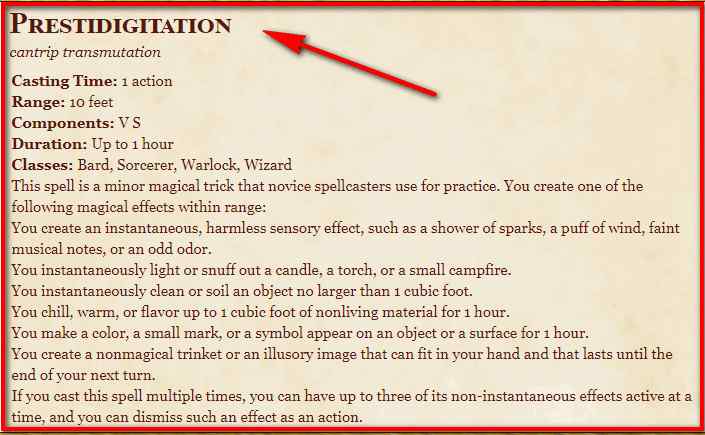As a fellow magic enthusiast, I know how important it is to choose the right cantrip for your spellcasting arsenal. Two of our favorite go-to spells in any tabletop roleplaying game are Minor Illusion and Prestidigitation. These versatile spells have saved many an adventuring party from dire situations or provided creative solutions to tricky problems.
But when it comes down to picking one over the other, which magical trick should you prioritize? That’s what we’re here to figure out together. In this article, we’ll dive deep into both Minor Illusion and Prestidigitation, looking at their various applications and weighing up their pros and cons.
We’ll explore scenarios where each spell shines brightest so that by the end of our discussion, you’ll be able to make an informed decision about which cantrip deserves a spot on your character sheet. So grab your wizard hat (or bard lute) and let’s get started!
In a hurry? Here’s a quick & short answer that’ll help you out:
Minor Illusion and Prestidigitation are both useful cantrips in different scenarios. Minor Illusion excels in creating visual or auditory illusions for deception or distraction, while Prestidigitation offers versatile utility with minor magical effects, like cleaning, flavoring, or creating small trinkets. Choose based on your character’s needs and playstyle for the best results.
Minor Illusion

Picture this: you’re in the middle of an intense game of Dungeons & Dragons, and your party is surrounded by enemies. Suddenly, a sharp crack echoes through the air as your wizard casts minor illusion, causing their foes to pause in confusion just long enough for your group to make a swift escape.
With its seemingly limitless cantrip uses and endless potential for creativity, it’s no wonder why minor illusion has become such a popular choice among spellcasters.
Minor illusion is one of those spells that allows you to flex your imaginative muscles while also providing practical benefits. As a cantrip, it doesn’t require any spell slots or components beyond somatic and material (a small piece of fleece), making it incredibly useful during tight spots when other resources are scarce.
The main function of minor illusion is to create either auditory or visual illusions within range that last up to 1 minute unless otherwise dismissed. This means you could use it to distract guards with phantom footsteps down a hallway or convince others there’s treasure hidden behind an illusory wall.
What sets minor illusion apart from other spells is how versatile it can be depending on the situation at hand. While its limitations lie in the size (no larger than a 5-foot cube) and complexity (cannot create light, sound-proof barriers or physically interactable objects) of the illusions created, clever players may still find countless ways to utilize this spell outside combat scenarios – think impersonating voices or masking unpleasant odors.
As we’ve seen so far, minor illustration certainly holds its own merits; however, another magical option awaits you – prestidigitation!
Boasting some unique features that cater more towards convenience rather than deception, Prestidigitation is an excellent choice for those who desire a versatile and practical spell. This cantrip is perfect for performing small tricks, enhancing everyday life, and adding a touch of flair to your magical repertoire.
Prestidigitation

So, you want to know more about prestidigitation? Great choice! This is one of the most versatile cantrips in any spellcaster’s arsenal.
When it comes to spell comparisons, prestidigitation often stands out as a jack-of-all-trades. It may not have the same immediate impact as minor illusion, but its sheer range of applications makes it an invaluable tool for any adventurer.
Now let me paint a picture for you with some examples of what prestidigitation can do:
- Cleaning or soiling objects
- Make your dirty clothes fresh and clean again after a long journey
- Cover someone’s pristine white shirt with embarrassing stains during negotiations
- Creating small sensory effects
- Produce faint musical notes to accompany your storytelling around the campfire
- Cause tiny puffs of wind that make leaves rustle mysteriously
The trick here is that while each individual effect might be minor, they’re all bundled into one handy package – there’s no need to learn multiple spells when this single cantrip covers so much ground.
Prestidigitation allows you to channel your creativity and find clever solutions to problems; it rewards ingenuity and quick thinking. Plus, who doesn’t love being able to light candles or torches on command?
So there we have it: both minor illusion and prestidigitation are fantastic options for their own reasons. While minor illusion excels at creating convincing visual deceptions, prestidigitation shines through its versatility and adaptability across various scenarios.
Now that we’ve covered these two remarkable spells individually, let’s move forward by diving deeper into the key differences between them and how they complement each other in your magical toolkit.
Key Differences Between Minor Illusion And Prestidigitation
Now, I know what you’re thinking: ‘How can we compare these two d&d spells when they serve entirely different purposes?’
Well, my friend, that is precisely why it’s essential to examine the key differences between Minor Illusion and Prestidigitation. Having a thorough understanding of their unique attributes will help us determine which spell is better suited for specific situations in your Dungeons & Dragons gameplay.
Firstly, let’s discuss the effects each spell produces. While both are classified as cantrips (meaning low-level spells), Minor Illusion focuses on creating an image or sound within range, whereas Prestidigitation allows for multiple minor magical effects at once.
This difference means that if you want to create a small distraction or provide cover for your party during combat encounters, Minor Illusion could be more beneficial.
On the other hand, if you need versatility in your magic arsenal – like cleaning items, lighting fires quickly, or flavoring food – Prestidigitation would be the go-to choice.
Next up is duration and range. Minor Illusion has a duration of 1 minute with a maximum range of 30 feet while Prestidigitation lasts up to an hour but only affects objects within 10 feet. Thus, depending on the situation and how long you require the effect to last, one may outweigh the other.
For example, keeping an enemy distracted by an illusion might benefit from Minor Illusion’s longer range; however, having continuous access to numerous helpful tricks throughout a dungeon crawl could make Prestidigitation more appealing.
Versatility plays a significant role in determining which spell stands out as superior. Although both have merits in various scenarios, many players lean towards Prestidigitation due to its wide array of applications over time compared to Minor Illusion’s singular purpose per casting.
That being said, don’t discount the power of illusions! In fact, there are countless imaginative ways to leverage Minor Illusion to your advantage during gameplay – and that’s precisely what we’ll explore in the next section.
Creative Uses For Minor Illusion In Gameplay

As a long-time fan of Dungeons and Dragons, I’ve always found Minor Illusion to be a wonderfully versatile cantrip that can lead to some incredibly creative role-playing scenarios. Whether you’re trying to keep your party safe from harm or just having fun with the locals in a tavern, this spell provides endless possibilities for those willing to think outside the box.
One of my favorite uses for Minor Illusion is creating distractions during combat. Picture this: your team is surrounded by enemies and things aren’t looking good.
You quickly cast Minor Illusion, crafting an image of a fearsome dragon roaring into existence behind your foes. Suddenly, they’re panicking and distracted – giving your allies the perfect opportunity to strike while their guard is down. Just like that, you’ve turned the tide of battle using nothing but quick thinking and clever illusion magic.
Another fantastic use for Minor Illusion involves disguising objects or even entire areas. Imagine stumbling upon a hidden treasure chest deep within a dungeon crawl.
Instead of leaving it vulnerable while you continue exploring, why not create an illusory wall around it? Now any would-be thieves will have no idea what’s lurking behind that seemingly ordinary section of stone!
Or perhaps your party needs to take shelter but lacks proper camouflage; simply conjure up an image of dense foliage surrounding your campsite and blend seamlessly into the environment.
Of course, there are countless other ways to employ this nifty little spell in gameplay – limited only by one’s imagination!
From simulating ghostly whispers echoing through haunted halls to mimicking footprints leading away from traps – the potential uses for Minor Illusion are virtually limitless in making every adventure all the more thrilling and immersive.
So go ahead, give it a try next time you find yourself facing challenging situations in-game – trust me when I say that creativity goes hand-in-hand with magical prowess!
Now that we’ve explored some ingenious applications of Minor Illusion let’s have a look at the equally inventive ways to use another popular cantrip: Prestidigitation.
Creative Uses For Prestidigitation In Gameplay
Now that we’ve explored the wonders of Minor Illusion, let’s dive into the fascinating world of Prestidigitation! This spell is like a Swiss Army knife for arcane tricksters and imaginative players.
It can create a wide array of small magical effects, making it an excellent tool for enhancing your character’s personality or getting out of tricky situations.
Here are some creative uses for Prestidigitation in gameplay:
- Cleaning or soiling objects to impress (or disgust) NPCs
- Creating sensory effects like scents or sounds to distract enemies
- Instantly lighting candles or snuffing them out to set the mood in a room
- Changing the flavor or color of food and drinks to win over picky eaters or disguise poison
- Marking targets with a glowing symbol during combat for easier coordination
With these examples in mind, you might find yourself using Prestidigitation more often than expected. The versatility of this spell allows you to come up with countless other applications limited only by your imagination.
Whether it’s spicing up interactions with NPCs, finding clever solutions to problems outside combat, or aiding allies during battle – there’s no denying its potential!
The key to mastering Prestidigitation lies in thinking creatively about how magic could enhance your character’s role-playing experience. Don’t be afraid to experiment with different approaches; as they say, practice makes perfect.
Remember, while both Minor Illusion and Prestidigitation have their unique strengths and drawbacks, what matters most is how well you use them within the game world.
So now that we’ve delved into the intricacies of these two spells, it’s time for you to decide which one suits your character best. In our next section, we’ll explore strategies on selecting the ideal spell based on your individual playstyle and preferences – don’t miss it!
Choosing The Right Spell For Your Character

Imagine yourself standing in a dimly lit dungeon, the walls lined with eerie shadows and echoes of distant drips creating an unsettling atmosphere. Your party is huddled together, preparing for the next encounter that could be lurking around any corner.
This is where your choice of spell can make all the difference between success and failure. As a budding wizard, you have to decide which among minor illusion and prestidigitation best suits your character’s background, abilities, and overall contribution to your team.
To help you make this crucial decision, consider the following table comparing key aspects of these two spells:
| Aspect | Minor Illusion | Prestidigitation |
|---|---|---|
| Functionality | Creates visual or auditory illusions | Performs small magical tricks |
| Versatility | Limited to illusions within 5-foot cube | Wide variety of effects (cleaning, heating, flavoring…) |
| Duration | Lasts up to 1 minute | Each effect lasts up to 1 hour |
| Utility | Distracting enemies & creating diversions | Solving everyday problems & adding flair |
As you ponder over each aspect listed above, let it sink into your heart and resonate with what truly excites you as a player. Are you drawn towards crafting intricate deceptions with minor illusion?
Or does the thought of being able to conjure endless creative solutions through prestidigitation thrill you even more? Ultimately, only you know who your character really is deep down inside – someone who thrives on deceiving others or one who revels in versatility and adaptability.
Now that we’ve explored both spells individually, it’s time for something even more fascinating: combining their powers! Why limit yourself when countless possibilities are awaiting those bold enough to experiment with using minor illusion and prestidigitation together?
So take a leap into uncharted territory and discover how these two spells can complement each other in ways you never imagined possible.
Can Minor Illusion And Prestidigitation Be Used Together?
So you might be wondering, can Minor Illusion and Prestidigitation be used together? Well, the answer is yes! In fact, combining these two spells can lead to some pretty interesting and creative results.
As a spellcaster, it’s essential for me to think outside the box when dealing with different situations or even just trying to entertain my friends.
For example, let’s say I want to create an illusion of a small dragon perching on top of a treasure chest. With Minor Illusion alone, I could achieve this but without any added effects like smoke coming from its nostrils or sparks flickering around it.
This is where Prestidigitation comes in handy; by using both spells simultaneously, I can add those extra touches that make the scene more believable and impressive.
Another scenario could involve creating distractions during combat or tense situations. Picture this: we’re cornered by several enemies who seem ready to attack at any moment.
Using Minor Illusion, I quickly craft an image of our group running off in another direction while simultaneously casting Prestidigitation to create sounds mimicking our footsteps as they fade into the distance. The combination of visual and auditory deception would hopefully buy us enough time to escape unnoticed.
The possibilities are truly endless when you start mixing these two spells together. As long as you keep your creativity flowing and stay within the boundaries set by each spell, there’s no limit to what you can achieve!
Now that we’ve explored how well Minor Illusion and Prestidigitation complement each other let’s delve deeper into which spell offers more versatility overall – so stay tuned!
Which Spell Is More Versatile?
You know what they say, ‘variety is the spice of life,’ and when it comes to choosing between Minor Illusion and Prestidigitation in Dungeons & Dragons, that adage couldn’t be more accurate.
Both spells have their unique flair and usefulness, but today we’ll dive into which one offers greater versatility for your spellcasting needs.
Minor Illusion has its charms (pun intended), allowing you to create a sound or an image within range. This can come in handy during those tense moments where a distraction could mean the difference between success and failure.
However, this illusion relies on your creativity as well as how cleverly you describe your intentions to the Dungeon Master; not every situation will call for such illusions.
On the other hand, Prestidigitation holds a myriad of possibilities with just a flick of your wrist – from igniting small fires to cleaning soiled garments, even adding flavor to bland food!
It’s described as a ‘magical trinket’ because it encompasses multiple minor magical effects rolled into one convenient package.
While these effects might seem trivial at first glance, any seasoned adventurer knows that sometimes it’s the little things that make all the difference in a campaign.
So if I had to choose between Minor Illusion vs Prestidigitation based on versatility alone, I would lean towards picking up Prestidigitation.
Its wide array of applications provides endless opportunities for creative problem-solving both in combat scenarios and day-to-day interactions throughout your journey.
Now let’s move on to discuss some ways you can incorporate these spells in role-playing without going overboard.
How Can I Incorporate These Spells In My Role-Playing?
As a fellow role-player, I totally get the excitement of incorporating spells like Minor Illusion and Prestidigitation into your game. These cantrips open up so many possibilities for creative problem-solving and character development!
So let’s dive in and explore some ideas on how to make the most of these magical tools.
- Spicing up social encounters:
Both Minor Illusion and Prestidigitation offer tons of potential for making an impression during diplomatic or tense situations. You could use Minor Illusion to create a ghostly whisper that only your target can hear, subtly influencing their decisions.
Or you might employ Prestidigitation to change the color of your clothing, matching the attire of nobility or blending in with local customs.
- Enhancing performances:
If you have a bard or other performer in your party, combining talents with illusion magic can lead to unforgettable shows. Imagine using Minor Illusion to conjure captivating images synchronized with stirring music, or utilizing Prestidigitation to produce small bursts of flame as dramatic punctuation.
- Creating diversions:
In those moments when you need a quick distraction, both spells are perfect for getting out of sticky situations. With Minor Illusion, craft lifelike sounds or images to draw attention away from your position – perhaps the distant sound of approaching guards?
Meanwhile, Prestidigitation allows for more subtle tricks like snuffing lights out briefly or creating faint odors that set people searching for their source.
Remember not just what these spells do but consider who is casting them; think about how each spell reflects the personality and objectives of your character. A cunning rogue may favor practical applications while an eccentric wizard revels in amusing pranks.
Whatever path you choose, keeping true to your character will make weaving these enchantments into gameplay all the more rewarding – leaving lasting memories around the table (or virtual one) and enhancing everyone’s experience within this shared, magical world.
Conclusion
Both spells offer a range of creative uses that can enhance role-playing experiences, but their applications differ slightly.
So, which spell will you choose? The captivating visual displays of Minor Illusion or the versatile bag of magical tricks that is Prestidigitation?
The decision is yours to make – let your imagination run wild!






